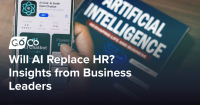How Employers Can Invest in Employees Amid AI's Growing Influence
As the influence of AI grows, we asked business leaders and HR professionals how employers can reassure their employees of their continued importance.
September 27th, 2023
With artificial intelligence (AI) tools evolving at a rapid rate, many employees fear that their roles could soon become obsolete. As the influence of AI grows, we asked business leaders and HR professionals how employers can reassure their employees of their continued importance. From leveraging AI for an enhanced employee experience to asking for feedback from your team as you integrate, here are the top nine ways these experts suggest to invest in employees and assure them of their relevance in the AI era.
Leverage AI for Enhanced Employee Experience
OpenAI is a technology enabler that synthesizes past knowledge based on information on the internet. It is not a creator that anticipates and creates new insights based on an unknown future.
Employees can find meaning (believe), learn (become), and connect (belong) through their activities at work, and OpenAI can provide knowledge to help create this positive employee experience. No longer will employees need to spend inordinate amounts of time doing research on the past or learning what was done, but they can probe creative ideas about what can be done.
Dave Ulrich, Rensis Likert Professor, University of Michigan - Stephen M. Ross School of Business
Educate Employees About AI's Role
Teach them what AI is. The major source of worry stems from not knowing what AI entails and being afraid of the word "artificial intelligence." What we call AI today can not mimic a functional human being. It can not keep track of a state for very long durations (i.e., memory), nor perform arbitrary actions to complete a task (i.e., freedom or self-sufficiency). It is nothing but millions and millions of mathematical operations stacked on top of each other.
After realizing its shortcomings, it is easier to see the potential benefits of AI: for limited, repetitive tasks that do not require a variety of actions or long-term memory, AI is the perfect solution. Consequently, if used properly, it is the perfect assistant for any office worker. If one can make use of such an assistant efficiently, then they can focus better on value-bringing tasks, therefore increasing their self-worth considerably.
Eren Akbiyik, CEO and AI Expert, Showzone
Involve Employees in AI Integration Decisions
Given the digital nature of our business and the growing influence of AI over the past twelve months, our employees have become restless and concerned. As such, we have made it clear as an organization that we will use AI solely as a supplementary tool and not as a replacement for human capital.
We delivered this message during department meetings by stressing the human element of each position that could not be replaced. Additionally, to make this message stick, we conducted a survey among the different departments, asking what AI tools they could integrate into their workflows to enhance efficiency.
Approaching the AI topic in this fashion makes the employees feel as if they are in control of the situation since they can pick and choose which tools to use.
Janelle Owens, Human Resources Director, Guide2Fluency
Invest in Specialized Industry Knowledge
At QBench, most of the team has a genuine specialization in laboratory automation. Because LLMs are trained on publicly available information, this is a zone of knowledge where they would be incredibly weak due to lack of material.
Our employees know this, so talk of AI has been mostly regarding how it could improve customer support or help our customers compose reports and letters out of the platform. We will continue to invest in training that gives us an edge in specialized industry knowledge.
Trevor Ewen, COO, QBench
Emphasize the Value of Human Connection
The world is undeniably in a delicate transition, and employers need to invest in employees and reinforce their value amidst AI's growth.
In the relocation industry, we emphasize how employee roles heavily rely on interpersonal experience, something AI simply can't replicate. Understanding a client’s unique needs, emotions, and challenges during a move requires empathy and human connection, and we demonstrate the importance of this to our workforce.
This individualized touch highlights the human element that AI lacks, showing employees they are indispensable and their contributions are deeply appreciated.
Guy Sharp, Relocation Manager, Andorra Guides
Offer AI Mastery Through Learning Programs
Instead of scaring employees with what AI tools can do and leaving them feeling replaceable, you can start offering learning and development programs that teach employees how to master AI tools. They can use them to create efficient and accurate work that helps improve the process. This will not only reassure them, but will also improve their skills and productivity.
Max Wesman, Chief Operating Officer, GoodHire
Promote Transparency About AI Plans
Every employee in organizations worldwide is aware of the influx of AI. In industries where AI tech is already being labeled as the next big thing, employees are even anxious about what's next. Under these circumstances, it is vital to win the confidence of your workforce. Letting the workforce in on the organization's plans about AI is the best way to accomplish this goal.
The first advantage to this approach is that you will openly declare to your workforce how you intend to be transparent about this entire issue. Second, when you lay out your plans, your employees will stop fearing AI and look forward to using it to boost efficiency and productivity. More importantly, when your employees understand how the AI solutions you plan to introduce will only make things easier for them, they will even help you in adoption and deployment.
Riley Beam, Managing Attorney, Douglas R. Beam, P.A.
Develop Soft Skills AI Can't Emulate
Investing in the development of soft skills that AI can't emulate is a great way employers can assure employees of their enduring value in an AI-influenced workplace. Human abilities such as creativity, leadership, empathy, and problem-solving are invaluable and aren't easily replicated by machines.
Employers can demonstrate the importance of these human-centric roles through recognition, promotion, and training programs that foster their development. By emphasizing these uniquely human traits, employers can show employees that despite the rise of AI, their contributions remain indispensable.
Curran Van Waarde, Founder, CallScaler
Ask for Feedback in the Integration Stage
I believe that we should include employees in the process of AI integration. Seek their feedback on how AI can improve their roles and provide better support.
By involving them in decision-making and implementation, employees will view artificial intelligence as a beneficial tool rather than a threat. This approach also allows employees to feel ownership over the changes, which fosters a positive attitude toward AI adoption.
Edward Mellett, Co-Founder, TestHQ
Final Thoughts
As AI continues to evolve, it is essential that employers recognize, educate, and reassure employees about how AI is able to enhance their roles rather than replace them. By involving employees in AI decisions, promoting transparency, and asking for feedback, employers can help their employees feel confident in AI's position as a useful tool to help them succeed.
Recommended Posts
How to Automate Your Sourcing with ChatGPT
Blog Articles
9 Insights About AI's Impact on HR Teams
Blog Articles
Search...
Product
GoCo
Resources
Articles
eBooks
Webinars
Customer Stories





